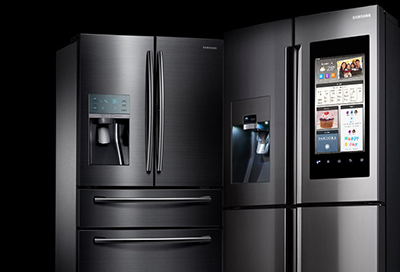Ever found yourself puzzled by the peculiar noise coming from your Samsung refrigerator, only to have it mysteriously stop when you open the door? You’re not alone.
This curious occurrence can leave you wondering if something is wrong or if it’s just a quirky feature of your appliance. Understanding why this happens is not just about solving a mystery; it could be crucial for maintaining the longevity and efficiency of your refrigerator.
Imagine the relief of knowing exactly what’s happening and how to address it. By diving deeper into this topic, you’ll uncover practical insights that can save you time, frustration, and potentially costly repairs. Stick around as we explore the reasons behind this phenomenon and provide you with actionable solutions. Your peace of mind is just a read away.
Common Causes Of Refrigerator Noise
Samsung refrigerator noise might stop when the door opens due to fan issues. The fan inside the fridge may encounter obstructions or malfunction, causing noise when the door is closed. Opening the door may halt the fan, temporarily reducing the sound.
When you hear unusual noises coming from your Samsung refrigerator, it can be both annoying and concerning. While some sounds are normal, like the gentle hum of the motor, others might indicate an issue. If the noise stops when you open the door, it’s a clue that something inside might need your attention. Understanding the common causes of refrigerator noise can help you troubleshoot and potentially fix the problem before it gets worse.
Fan Issues
One frequent culprit of refrigerator noise is the fan. The evaporator fan circulates air over the evaporator coils, cooling the fridge. If you hear a rattling or buzzing sound, the fan blades might be hitting something. Dust buildup can also cause the fan to run unevenly. Checking the fan is relatively simple. Unplug the refrigerator and remove the panel covering the fan. Ensure nothing obstructs the fan blades and clean any dust you find. A quick cleaning could be all it takes to restore peace.
Compressor Problems
The compressor is the heart of your refrigerator. It pumps refrigerant through the system, keeping your food cold. A noisy compressor could mean it’s working harder than it should be, possibly due to age or a refrigerant issue. If the compressor noise bothers you, listen carefully to determine if it’s a clicking, buzzing, or humming sound. Each type of noise can indicate different issues. A consistent buzzing might suggest a problem with the compressor motor, while clicking could mean the relay is malfunctioning.
Defrost Timer Malfunctions
The defrost timer controls when your refrigerator goes through its defrost cycle. If this timer malfunctions, it can cause unusual noises. You might hear a ticking or knocking sound if it’s faulty. To address this, locate the defrost timer, often found near the control panel. Listen for the sound and feel the timer for any unusual vibrations. Replacing the defrost timer is usually an easy fix, but it might require a professional if you’re not comfortable doing it yourself. Have you ever taken matters into your own hands and fixed a household appliance? Tackling these common noise issues might save you from calling a repair technician. Addressing the root cause of the noise can extend the life of your refrigerator, keeping your kitchen running smoothly.
Why Noise Stops When Door Opens
Have you noticed your Samsung refrigerator getting noisy? Yet, the noise stops when you open the door. This might seem puzzling at first. Understanding why this happens can help you manage your refrigerator better.
Interaction Between Fan And Door
The fan inside the refrigerator circulates cold air. When the door is closed, the fan runs at full speed. This can sometimes create noise. The moment you open the door, the fan often slows down or stops. This is a safety feature. It prevents air from escaping quickly. It helps to maintain the cool temperature inside. The fan’s change in speed reduces the noise immediately.
Impact On Airflow
Airflow inside the refrigerator is crucial for cooling. When the door is closed, airflow is maintained. This ensures even cooling throughout. Opening the door alters this airflow. It causes the fan to adjust its operation. This change impacts the noise level. The reduced airflow means less noise. This adjustment helps keep the internal temperature stable. It also helps the refrigerator work efficiently. Understanding this can help you use your refrigerator wisely.
Troubleshooting Steps
Samsung refrigerators are known for their advanced features and reliability. Yet, at times, users experience unusual noises that stop when the door opens. Understanding the cause is essential for effective troubleshooting. Below are steps to identify and resolve the issue.
Inspecting The Fan
The fan inside the refrigerator circulates air. It helps maintain an even temperature. When the door closes, the fan runs. Open the door and the noise stops. Check if the fan blades are obstructed. Dust or debris can block them. Clean the fan and remove any obstacles. Ensure the blades spin freely. This may solve the noise problem.
Checking The Compressor
The compressor is vital for cooling. It can produce noise due to malfunction. Open the refrigerator’s back panel. Listen carefully to the compressor. If it sounds abnormal, there may be an issue. Inspect for leaks or damage. Ensure it is securely mounted. Loose parts can vibrate and cause noise. Tighten any loose screws or bolts.
Examining The Defrost Timer
The defrost timer controls the defrost cycle. It can sometimes create odd sounds. Locate the timer near the compressor. Listen for clicking or unusual noise. If the timer seems faulty, consider replacing it. A defective timer can disrupt the cooling cycle. Regular checks can prevent long-term issues.

Credit: www.youtube.com
Diy Fixes
Experiencing noise from your Samsung refrigerator can be frustrating. Often, this noise stops when the door is opened. This could be due to fan issues or ice buildup. Checking the fan and cleaning the ice might help solve the problem.
If your Samsung refrigerator makes noise but stops when the door opens, you might want to try some DIY fixes. These simple solutions can help you solve the issue without calling a technician. Let’s explore some effective steps you can take.
Cleaning The Fan
The fan might be dirty. Dust and debris often gather on it. This can lead to unwanted noise. Unplug the refrigerator first. Locate the fan at the back. Use a soft brush or cloth. Gently clean the fan blades. Make sure all dust is removed. This can reduce or stop the noise.
Adjusting The Compressor
A misaligned compressor can also cause noise. You may need to adjust it. First, unplug the refrigerator for safety. Locate the compressor at the back. Check if it is firmly attached. Tighten any loose screws. Ensure it sits level on the ground. A stable compressor can lower noise levels.
Replacing The Defrost Timer
A faulty defrost timer might be the culprit. It could produce odd noises. You need to replace it. First, unplug the fridge. Find the defrost timer in the control panel. Remove the old timer carefully. Install a new one by following the manual. This may resolve the noise issue.
When To Call A Professional
Strange noises from your Samsung refrigerator might stop when you open the door. This could indicate an issue with the fan or compressor. It’s time to call a professional if the noise persists, ensuring your appliance runs smoothly and efficiently.
When your Samsung refrigerator starts making strange noises, it can be both annoying and concerning. You might notice that the noise stops when you open the door. This could be a sign that something isn’t quite right. How do you know when it’s time to call a professional? Let’s explore some signs of serious issues and the benefits of expert assistance.
Signs Of Serious Issues
If your refrigerator noise stops when the door is open, it might be masking underlying problems. A persistent noise could indicate a malfunctioning fan or motor. If the noise changes in pitch or volume, it could signal a more severe issue. Another sign of trouble is if your fridge isn’t maintaining the correct temperature. Warm spots or inconsistent cooling are red flags. Also, if you notice any unusual odors or leaks, these could be signs of a refrigerant leak, which requires immediate professional attention. Consider the age of your refrigerator. Older models might be more prone to wear and tear. If your refrigerator is over ten years old, recurring noises might suggest it’s time for an upgrade or professional maintenance.
Benefits Of Expert Assistance
Calling a professional can save you time and stress. They can quickly diagnose the problem and provide a solution. This means you won’t have to spend hours trying to figure it out yourself. Expert assistance ensures the issue is resolved safely and effectively. Professionals have the right tools and knowledge to handle electrical components and refrigerants. This reduces the risk of injury or further damage to your appliance. Additionally, regular professional maintenance can extend the life of your refrigerator. An expert can spot potential problems before they become major issues. This proactive approach can save you money in the long run by avoiding costly repairs or replacements. When was the last time you had your refrigerator checked by a professional? It might be time to schedule a visit and ensure everything is running smoothly. Your peace of mind is worth the investment.

Credit: www.samsung.com
Preventive Measures
Addressing noise issues in Samsung refrigerators requires preventive measures. Regular checks and upkeep help maintain optimal performance. By focusing on preventive care, you can minimize noise disturbances. A smooth-running refrigerator ensures a peaceful home environment. Below are essential tips to keep your appliance quiet and efficient.
Regular Maintenance Tips
Clean the condenser coils every six months. Dust buildup affects cooling efficiency. Use a vacuum cleaner or a coil brush. Ensure the refrigerator stands level on the floor. Adjust the front legs for stability. Check the door seals for wear and tear. Replace faulty seals to avoid energy loss. Inspect the fan blades for obstructions. Remove debris to allow smooth operation. Regular maintenance reduces noise and extends appliance life.
Monitoring Noise Levels
Listen for unusual sounds from your refrigerator. Identify whether the noise changes with door movement. Document any significant noise variations. Keep a noise log to track patterns. This information aids technicians in diagnosing problems. Use a decibel meter to measure sound levels. Compare readings against normal operating ranges. Regular monitoring catches issues early. Early detection prevents costly repairs.

Credit: fleetappliance.com
Frequently Asked Questions
Why Does My Samsung Fridge Make Noise?
Fridge noise can be due to the compressor, fans, or ice maker. It’s normal.
Is It Normal For Noise To Stop When The Door Opens?
Yes, opening the door pauses fans and reduces noise temporarily. It’s by design.
How Can I Reduce Refrigerator Noise?
Ensure the fridge is level and items aren’t blocking vents. Check for loose parts.
Should I Worry If Noise Stops When The Door Is Open?
No, it’s common. But check if it happens with other signs like cooling issues.
What Are Common Causes Of Refrigerator Noise?
Vibrations, fan, ice maker, or compressor. Regular maintenance can help minimize noise.
Conclusion
Experiencing noise when the refrigerator door is closed can be puzzling. Understanding the cause helps ease your worries. Common reasons include fan issues or vibrations. A quick check might solve the problem. Regular maintenance is key. It ensures your appliance runs smoothly.
Listening closely can pinpoint the source. Don’t ignore unusual sounds. Early attention prevents costly repairs. Consult the manual for guidance. Peaceful kitchens are possible with a little effort. Your Samsung refrigerator can be quiet and efficient. Enjoy a serene home environment.
Consider professional help if needed. Keeping your fridge quiet boosts satisfaction.





